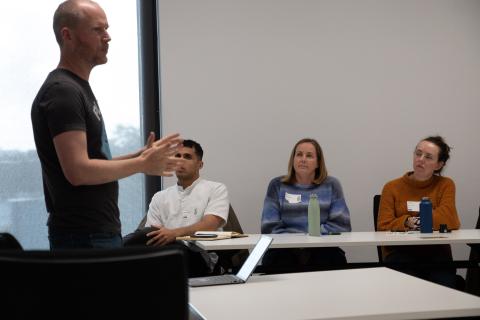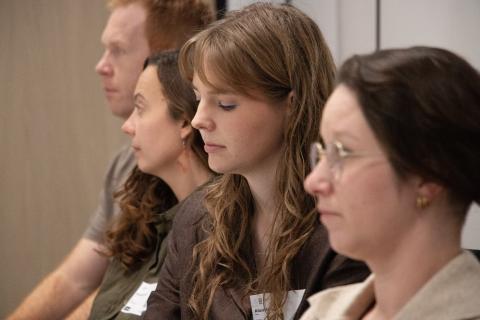


The Early and Mid-Career Academics and Practitioners (EMCAP) Network advocates for the next generation of natural hazards leaders by supporting and fostering excellence in the science and management of natural hazards.
In the following blog, EMCAP Executive Committee Chair Hamish Clarke (University of Melbourne) reflects on EMCAP Day, where early and mid-career academics and practitioners from the Australian natural hazards research sector attended a full day workshop hosted by Natural Hazards Research Australia.
A vibrant community of emerging leaders in disaster resilience gathered on Kaurna Country for the inaugural EMCAP Day. Held at the South Australian Fire and Emergency Services Commission (SAFECOM) in Adelaide ahead of the Natural Hazards Research Forum 2025, the event brought together a diverse group of early and mid-career academics and practitioners involved in natural hazards research.
A networking activity kicked off the day to help take the sting out of ‘working the room’. This set the tone for the day, creating enthusiasm in the room as people sought out contacts and ideas for their partner, rather than themselves.

Sarah Mizzi, Centre Partnership Development Director, then shared her 10 tips for building effective partnerships for impact, including:
EMCAP Executive Committee Chair Hamish Clarke reflected on the successes and copious rejections for a variety of grants, including those submitted to the Australian Research Council and a Westpac Fellowship. This was followed by a panel discussion on different career perspectives from working in government, consulting and academia with Hamish and fellow EMCAP Executive Committee members Kamarah Pooley (Fire and Rescue NSW) and Petter Nyman (Alluvium Consulting).
The Centre’s Communications Team, Ainsley Burgess, Joanna Wood, Friedo Ligthart and Lina Wood, guided participants on how to craft impactful ‘elevator pitches’ through techniques from journalism including storytelling, to boost research translation. Attendees were encouraged to focus test the pitches at the Forum. The opportunity to film a one-minute video pitch was also made available by the team. Engaging discussions on the evolving needs of communicating practice and research including the use of TikTok also took place.
Finally, a ‘Tomorrow Party’ was facilitated by EMCAP Executive Committee members Adriana Keating (Fire to Flourish, Monash University) and Kirstin Kreyscher (Deakin University). Attendees transported themselves to the future, envisioning natural hazards research sector in 2030 and what it will look like from their view. Attendees were then asked to consider what changes occurred in the last five years to bring about this ideal scenario.

The EMCAP Executive Committee is extremely grateful to attendees for contributing energy and ideas to the day, to the Centre for supporting the event, and to SAFECOM for generously providing the venue.
Please spread the word and invite others to join the EMCAP Executive Committee and the broader EMCAP community as we continue to support Australia’s future leaders in natural hazards research and practice.